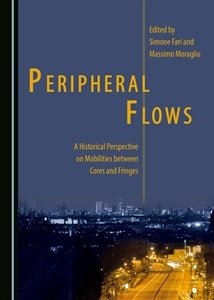Peripheral Flows: A Historical Perspective on Mobilities Between Cores and Fringes
- Author(s)
Simone Fari, Massimo Moraglio
- Publisher
- Cambridge Scholars Publishing
- Year
- 2016
- Nr. of Pages
- 275
- ISBN
- 1-4438-9048-0

Com contribuições dos CIUHCTers Maria Paula Diogo, José Barros Rodrigues, M. Luísa Sousa e Ana Paula Silva
Resumo (em Inglês)
The main purpose of the eleven contributions to this volume is to reconsider and re-assess the role of cores and peripheries in shaping modern socio-technical systems. From this perspective they explore a terrain of highly complex systems mainly operating on the so-called Western model: Railways, telegraphs, motor vehicles and airports were, in fact, all born in classic cores areas in the West and then spread out into the peripheries. The approach in itself is not new, but this volume has managed to bring out interestingly innovative elements and viewpoints. The contributors are not content with the traditional definitions of peripheries and flows, but tend to put them to the test, revise them and eventually offer critiques. The result is a tempering of the monolithic and traditional concept of a one-way transfer. No longer, therefore, a simple and linear act of adoption, but a recourse to adaptation – changes in meaning, use and perception. The volume is a starting point for future explorations on the subject of science and technology studies and takes part in a wider discussion of globalisation, global and transnational history.
Índice (em IngLês)
- Acknowledgements, p. vii
- Introduction, p. 1
- Simone Fari and Massimo Moraglio, The Function of Flows between Cores and Peripheries
- Part I: Mapping the Field
- Gabriele Balbi and Massimo Moraglio, A Proposal to Hybridise Communication and Mobility Research Agendas, p. 10
- Alexia-Sofia Papazafeiropoulou, The Affirmation of Semi-Periphery: A Case-Study on Greek Automobility, 1930-2000, p. 28???????
- José Barros Rodrigues and Maria Paula Diogo, Re-Assessing Portuguese Coachbuilding and Motor Taxicabs in the Early 20th Centurye, p. 51???????
- Part II: Between Cores
- Irene Anastasiadou???????, Constructing European Centres and Peripheries through Railway Corridors: The Case of Greece, p. 74???????
- CS?awomir ?otysz???????, 89mm from Europe: Mediating Railway Mobility on Russia’s Western Peripheries, p. 100???????
- Dhan Zunino Singh???????, The Circulation and Reception of Mobility Technologies: The Construction of Buenos Aires’s Underground Railways, p. 127???????
- Part III: Linking Peripheries
- Leonardo Caruana de las Cagigas???????, Motor-vehicle Insurance Policy in Spain after 1962: Is Peripherality So Crucial?, p. 154???????
- M. Luísa Sousa, Colonial Centres and Peripheries: Low-cost Roads and Portuguese Engineers in the 1950s, p. 169???????
- Victor Marquez???????, From Streamlined Agriculture to the Air City: Is the New Early Post-War American Airport a Moderniser of the Periphery?, p. 189???????
- Part IV: Linking Information
- Simone Fari, Telegraphs and Railways between Centrality and Marginality, p. 214
- Ana Paula Silva, The Centrality of Peripheral Nodes for Global Flows: The Portuguese Case, p. 236
- List of Contributors, p. 266